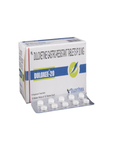dulodep
Introduction to dulodep
Dulodep is a medication primarily used to treat various mental health and pain-related conditions. It belongs to a class of drugs known as SNRIs, which stands for Serotonin-Norepinephrine Reuptake Inhibitors. These medications work by increasing the levels of serotonin and norepinephrine in the brain, which are chemicals that help regulate mood and pain.
Composition of dulodep
The active ingredient in Dulodep is Duloxetine. This compound is responsible for the therapeutic effects of the medication, helping to improve mood and alleviate pain.
Uses of dulodep
- Treatment of Major Depressive Disorder (MDD)
- Management of Generalized Anxiety Disorder (GAD)
- Relief from Diabetic Peripheral Neuropathy (nerve pain in diabetes)
- Alleviation of pain from Fibromyalgia
- Management of Chronic Musculoskeletal Pain such as lower back pain or osteoarthritis
Side effects of dulodep
Common side effects:
- Feeling sick to the stomach
- Dry mouth
- Sleepiness
- Constipation
- Decreased appetite
- Excessive sweating
Serious side effects:
- Nausea
- Tiredness
- Trouble sleeping
- Feeling dizzy
Precautions of dulodep
Before taking Dulodep, it's important to be aware of certain precautions. The medication carries a risk of suicidal thoughts, especially in young adults and during the initial treatment phase. It should be avoided in individuals with uncontrolled narrow-angle glaucoma, severe liver or kidney impairment, or a history of serotonin syndrome. Sudden discontinuation may lead to withdrawal symptoms. Use cautiously in individuals with bipolar disorder, seizures, or bleeding risks.
How to Take dulodep
- The usual dose is 60 mg once a day.
- Some individuals may start with 30 mg once a day for a week to adjust to the medication.
- Take the medication orally, with or without food.
Conclusion of dulodep
Dulodep is a valuable medication for managing depression, anxiety, and certain types of pain. By understanding its uses, side effects, and precautions, patients can work with their healthcare providers to effectively incorporate it into their treatment plan. Always follow your doctor's instructions and report any unusual symptoms promptly.
Similar Medicines
Available in 5 variations

Dulodep 20mg Tablet
Dulodep 20mg Tablet
strip of 10 tablets

Dulodep 60mg Tablet
Dulodep 60mg Tablet
strip of 10 tablets

Dulodep 30mg Tablet
Dulodep 30mg Tablet
strip of 10 tablets

Dulodep 10mg Tablet
Dulodep 10mg Tablet
strip of 10 tablets

Dulodep 40mg Tablet
Dulodep 40mg Tablet
strip of 10 tablets
Related Faqs

I am a hypertensive patient. I have noticed that my blood pressure has increased after I started taking Dulodep. Is it because of Dulodep, what should be done?
Dulodep may cause an increase in blood pressure. Therefore, regular monitoring of blood pressure is required, especially during the first month of use. If your blood pressure increase is constant, consult your doctor. It may indicate that your Dulodep dose either needs to be reduced or discontinued gradually.

If I start feeling better, can I stop taking Dulojoy?
It is essential to avoid abruptly discontinuing Dulojoy without first consulting with your doctor If you have been experiencing an improvement in symptoms related to depression and anxiety for a period of six months or more your doctor may consider gradually reducing your doses On the other hand if you are experiencing relief from pain and incontinence it is advisable to continue the longterm use of the medication However it is important to note that your doctor will continue to monitor your response to the medicine periodically typically every few months This ensures that your treatment plan is tailored to your specific needs and helps to optimize your overall wellbeing Therefore it is crucial to follow your doctors guidance and maintain open communication regarding any changes or concerns regarding your medication

If I start feeling better, can I stop taking Dulocare?
No, you should not stop Dulocare suddenly and without consulting your doctor. In cases of depression and anxiety, if you have been feeling better for 6 months or more, your doctor may reduce your doses gradually. In case of pain and incontinence, if you are feeling better, continue taking it for long term. Your doctor will keep monitoring your response to the medicine every few months.

I am taking warfarin, does Dularo interfere with warfarin? Is it safe to take both together?
If you happen to be taking both Dularo and warfarin it is crucial to exercise caution The combination of these two medications can potentially lead to various complications such as an increased risk of bleeding as well as the possibility of experiencing symptoms like petechiae or purpura Therefore it is important to monitor your condition closely and promptly notify your healthcare provider of any unusual or concerning symptoms that may arise By doing so you can ensure that appropriate precautions and adjustments to your treatment plan can be made to mitigate these potential risks Remember your health and safety should always be a top priority and open communication with your healthcare provider is key to effectively managing your medication regimen
Related Posts

1:15
How to Get a Correct Diagnosis for Depression?

1:15
Salt and Anxiety: Are They Connected?

1:15
Winter Blues: 7 Surprising Symptoms of Seasonal Affective Depression!

1:15
Panic attacks are more common than you think!

1:15
What is Emotional Hangover? What are the causes of Emotional Hangover?

1:15
How Do You Know If You Have a Vaginal Infection? Warning Signs!

1:15
Top Health Benefits of Cinnamon | How to Use It for Better Health!

1:15
Is Your Blood Pressure Too Low? What Are the Best Remedies to Fix Low Blood Pressure Instantly?

1:15
Mala D: How it works, When and How to take Mala D and Side Effects of Mala D!

1:15
Reduce Inflammation Naturally: Best Foods for Heart, Diabetes & Overall Health!






















.svg)
